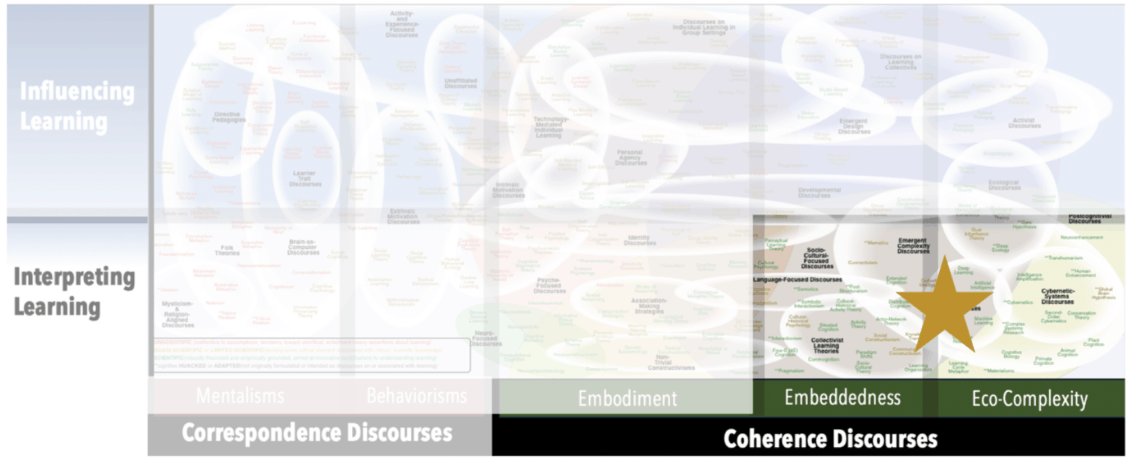Focus
Using quantum probability theory to model human thoughtPrincipal Metaphors
-
Knowledge is ... range of possible actionKnowing is ... doing, beingLearner is ... complex (emergent, evolving) agentLearning is ... adapting
- Teaching is … N/A
Originated
1990sSynopsis
Quantum Cognition draws on quantum information theory and quantum probability theory in efforts to develop mathematical models of human learning, perception, emotion, and thought. Importantly, proponents of Quantum Cognition do not assert that mind can be explained in terms of quantum mechanical processes (compare Quantum Mind). Rather, within Quantum Cognition, human thought is seen quantum-like – that is, analogous in some ways to quantum phenomena (e.g., fundamentally contextual; unavailable for objective study). Associated discourses include:- Quantum Darwinism (Wojciech Zurek, 2000s) – the proposition that the reality that one experiences is the result of a natural selection process for quantum states, where only stable, reproducible information survives and is accessible to observers
- Quantum Decision Theory (Andrei Khrennikov, 2000s) – a perspective that draws on principles of quantum physics (e.g., superposition, entanglement) to model decisions in ways intended to better account for ambiguity, unpredictability, and evolving contexts than classical, probability-based models
- Quantum Information Science – a domain that blends quantum mechanics and Information Science (under Cybernetics)
- Quantum Neuroscience (Quantum Neurobiology; Quantum Neurophysics) (Christof Koch, Klaus Hepp, 2000s) – a domain concerned with potential quantum effects in the brain and the application of Quantum Information Science to Neuroscience
Commentary
Quantum Cognition is typically described and defended in terms of the shortcomings of those models of cognition that are rooted in more traditional and/or conventional discourses. Such models, it is typically asserted, have hit barriers and/or are tied up in paradoxes. While there is some merit in those criticisms, it is not at all clear that the models developed by advocates of Quantum Cognition are any more compelling or useful.Authors and/or Prominent Influences
Diederik AertsStatus as a Theory of Learning
Quantum Cognition is a discourse on learning and cognition.Status as a Theory of Teaching
Quantum Cognition is not concerned with matters associated with teaching or formal education.Status as a Scientific Theory
Quantum Cognition is an emerging field that is rooted in nuanced understandings of quantum theory. Proponents assert that it holds much promise, but its assertions have yet to be tested or demonstrated in robust and substantial ways.Subdiscourses:
- Quantum Darwinism
- Quantum Decision Theory
- Quantum Information Science
- Quantum Neuroscience (Quantum Neurobiology; Quantum Neurophysics)
Map Location

Please cite this article as:
Davis, B., & Francis, K. (2024). “Quantum Cognition” in Discourses on Learning in Education. https://learningdiscourses.com.
⇦ Back to Map
⇦ Back to List
